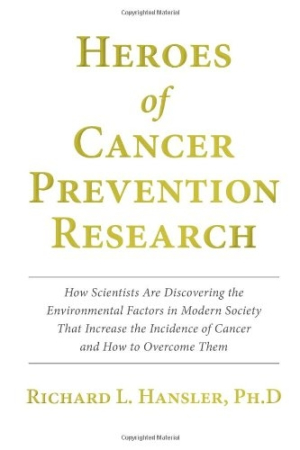Heroes of Cancer Prevention Research
How Scientists Are Discovering the Environmental Factors in Modern Society That Increase the Incidence of Cancer and How to Overcome Them
Environmental factors may play a part in cancer occurrence, and the title of Richard L. Hansler’s book, Heroes of Cancer Prevention Research: How Scientists are Discovering the Environmental Factors in Modern Society That Increase the Incidence of Cancer and How to Overcome Them, might make readers think they’re going to learn about several of them.Yet this short volume is, in fact, only about one environmental factor and its impact on cancer: exposure to light at night.
Each chapter of the book highlights the research on the subject by a different person or team, in particular how light exposure affects the rate of breast cancer. Studies have shown that nurses who work night shifts are more likely to get cancer than their day-working counterparts because they produce less melatonin. Hansler argues that these studies are important for everyone because all modern people are exposed to light at night, which disrupts the natural flow of melatonin.
As such, Hansler believes that all people could benefit from practices that reduce light exposure and block out the blue-spectrum waves found to be so detrimental to melatonin production. The whole book, in fact, seems to serve as buildup for the last paragraph: “Both men and women should either switch to safe light bulbs (that block blue light) at night or start wearing glasses that block blue light for a few hours before a consistent bedtime. Without action, knowledge is of little value.”
It seems appropriate that Hansler would come to this conclusion, as he is a physicist who did research for General Electric for more than forty years. He also runs a website that sells blue-blocking sunglasses, light bulbs, and filters for computer and television screens.
Discounting the fact that the volume is basically an advertisement, it is also largely a cut-and-paste job from the medical research database PubMed. The extensive quoting from research presentations and abstracts means there is a great deal of jargon and technical information that might overwhelm the average reader. Hansler seems to understand that, as in one place he presents a long excerpt from the abstract of a research paper followed by this statement: “Much of the meaning of the above paragraph is obscured by the use of highly technical terms.” He then goes on to rewrite the paragraph in something closer to layman’s terms. Some thoughtful editing would have removed the excerpt altogether and made for a better experience for the reader.
In all, this is a good summary of the research related to light at night and the incidence of breast cancer, in particular, as well as other cancers. But the jargon and the misleading title mean that many readers will probably finish this book disappointed that they didn’t learn more.
Reviewed by
Sarah White
Disclosure: This article is not an endorsement, but a review. The publisher of this book provided free copies of the book and paid a small fee to have their book reviewed by a professional reviewer. Foreword Reviews and Clarion Reviews make no guarantee that the publisher will receive a positive review. Foreword Magazine, Inc. is disclosing this in accordance with the Federal Trade Commission’s 16 CFR, Part 255.

